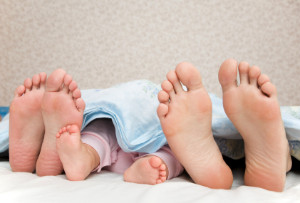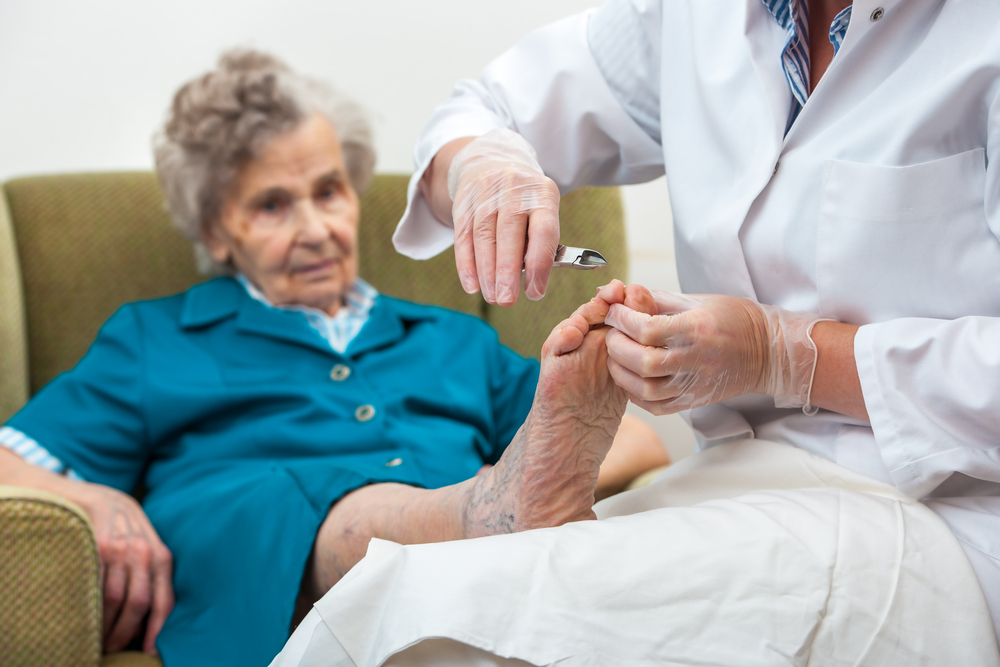Freehold (732) 294-9393
Freehold (732) 294-9393
 The most common cause of heel pain may be a condition that is referred to as plantar fasciitis. It occurs when the thick ligament that connects the heel to the front of the foot becomes inflamed. It’s purpose is to aid in walking, in addition to supporting the arch. Some of the symptoms that many patients experience is heel pain and moderate to severe stiffness, which may make walking up and down the steps difficult. This condition may affect people from all walks of life, and more specifically runners, women in late pregnancy, and those who are overweight. Additionally, this ailment may be caused by inherited traits, which may play a role in altering the structure of the foot. If you feel you may be afflicted with plantar fasciitis, it’s important that you contact a podiatrist as quickly as possible who can advise what the best possible treatment options are for you.
The most common cause of heel pain may be a condition that is referred to as plantar fasciitis. It occurs when the thick ligament that connects the heel to the front of the foot becomes inflamed. It’s purpose is to aid in walking, in addition to supporting the arch. Some of the symptoms that many patients experience is heel pain and moderate to severe stiffness, which may make walking up and down the steps difficult. This condition may affect people from all walks of life, and more specifically runners, women in late pregnancy, and those who are overweight. Additionally, this ailment may be caused by inherited traits, which may play a role in altering the structure of the foot. If you feel you may be afflicted with plantar fasciitis, it’s important that you contact a podiatrist as quickly as possible who can advise what the best possible treatment options are for you.
Plantar fasciitis can be very painful and inconvenient. If you are experiencing heel pain or symptoms of plantar fasciitis, contact Dr. Henry Miller from New Jersey. Our doctor can provide the care you need to keep you pain-free and on your feet.
What Is Plantar Fasciitis?
Plantar fasciitis is the inflammation of the thick band of tissue that runs along the bottom of your foot, known as the plantar fascia, and causes mild to severe heel pain.
What Causes Plantar Fasciitis?
How Can It Be Treated?
While very treatable, plantar fasciitis is definitely not something that should be ignored. Especially in severe cases, speaking to your doctor right away is highly recommended to avoid complications and severe heel pain. Your podiatrist can work with you to provide the appropriate treatment options tailored to your condition.
If you have any questions please feel free to contact our office located in Freehold, NJ . We offer the newest diagnostic and treatment technologies for all your foot and ankle needs.
 Increased pressure of a toenail that grows into the surrounding skin is often referred to as an ingrown toenail. This condition can often produce severe discomfort and pain as a result of inflammation that may occur. If this ailment is left untreated, infections can occur, which may lead to additional unwanted foot conditions. Typical reasons why ingrown toenails can develop, may include having a pedicure performed incorrectly, traits from inherited genes, or shoes that do not fit correctly. Medical conditions such as obesity, diabetes, bunions, or hammertoes may play a significant role in developing this painful condition. If you are afflicted with an ingrown toenail, it’s advised to seek a consultation with a podiatrist as quickly as possible to learn about correct treatment options.
Increased pressure of a toenail that grows into the surrounding skin is often referred to as an ingrown toenail. This condition can often produce severe discomfort and pain as a result of inflammation that may occur. If this ailment is left untreated, infections can occur, which may lead to additional unwanted foot conditions. Typical reasons why ingrown toenails can develop, may include having a pedicure performed incorrectly, traits from inherited genes, or shoes that do not fit correctly. Medical conditions such as obesity, diabetes, bunions, or hammertoes may play a significant role in developing this painful condition. If you are afflicted with an ingrown toenail, it’s advised to seek a consultation with a podiatrist as quickly as possible to learn about correct treatment options.
Ingrown toenails can become painful if they are not treated properly. For more information about ingrown toenails, contact Dr. Henry Miller of New Jersey. Our doctor can provide the care you need to keep you pain-free and on your feet.
Ingrown Toenails
Ingrown toenails occur when a toenail grows sideways into the bed of the nail, causing pain, swelling, and possibly infection.
Causes
Prevention
Because ingrown toenails are not something found outside of shoe-wearing cultures, going barefoot as often as possible will decrease the likeliness of developing ingrown toenails. Wearing proper fitting shoes and using proper cutting techniques will also help decrease your risk of developing ingrown toenails.
Treatment
Ingrown toenails are a very treatable foot condition. In minor cases, soaking the affected area in salt or antibacterial soaps will not only help with the ingrown nail itself, but also help prevent any infections from occurring. In more severe cases, surgery is an option. In either case, speaking to your podiatrist about this condition will help you get a better understanding of specific treatment options that are right for you.
If you have any questions please feel free to contact our office located in Freehold, NJ . We offer the newest diagnostic and treatment technologies for all your foot and ankle needs.
 Recent research has shown the importance of children walking barefoot or wearing shoes that have a soft sole when they are beginning to walk. This will enable the development of necessary muscle strength in addition to learning sensory information that originates from the soles of the feet. The feet should be properly measured once walking commences, to ensure a proper fit for shoes. Children’s feet grow rapidly, and frequent measuring of the feet will aid in choosing shoes that fit correctly. Foot conditions may develop as a result of poorly fitting shoes. These may include ingrown toenails, blisters, or the inability to walk correctly. When shopping for shoes, it’s important for the toes to have adequate room to move around and the front of the shoe should be wider than the heel. Most children are born with flat feet and arches will form when walking begins. Please consult with a podiatrist if your child appears to be flat-footed once walking has started.
Recent research has shown the importance of children walking barefoot or wearing shoes that have a soft sole when they are beginning to walk. This will enable the development of necessary muscle strength in addition to learning sensory information that originates from the soles of the feet. The feet should be properly measured once walking commences, to ensure a proper fit for shoes. Children’s feet grow rapidly, and frequent measuring of the feet will aid in choosing shoes that fit correctly. Foot conditions may develop as a result of poorly fitting shoes. These may include ingrown toenails, blisters, or the inability to walk correctly. When shopping for shoes, it’s important for the toes to have adequate room to move around and the front of the shoe should be wider than the heel. Most children are born with flat feet and arches will form when walking begins. Please consult with a podiatrist if your child appears to be flat-footed once walking has started.
The health of a child’s feet is vital to their overall well-being. If you have any questions regarding foot health, contact Dr. Henry Miller of New Jersey. Our doctor can provide the care you need to keep you pain-free and on your feet.
Tips for Keeping Children's Feet Healthy
If you have any questions, please feel free to contact our office located in Freehold, NJ . We offer the newest diagnostic and treatment technologies for all your foot care needs.
 It’s important to properly care for the feet, especially for diabetic patients. Minor cuts and scrapes may be slow to heal, which is often due to the elevated insulin levels. These high levels may cause the nerves to become damaged, which may in turn cause a lack of feeling in the feet. Research has shown there are ways to possibly prevent specific foot conditions from occurring. This may be accomplished by having regular foot exams, wearing shoes that are designed for various foot ailments that may be present, or by performing low-impact exercise. The nerve damage that may occur is referred to as neuropathy, and can be very painful. If you are diabetic, it is strongly suggested that you visit a podiatrist frequently while also being sure to do daily foot inspections at home.
It’s important to properly care for the feet, especially for diabetic patients. Minor cuts and scrapes may be slow to heal, which is often due to the elevated insulin levels. These high levels may cause the nerves to become damaged, which may in turn cause a lack of feeling in the feet. Research has shown there are ways to possibly prevent specific foot conditions from occurring. This may be accomplished by having regular foot exams, wearing shoes that are designed for various foot ailments that may be present, or by performing low-impact exercise. The nerve damage that may occur is referred to as neuropathy, and can be very painful. If you are diabetic, it is strongly suggested that you visit a podiatrist frequently while also being sure to do daily foot inspections at home.
Diabetic foot care is important in preventing foot ailments such as ulcers. If you are suffering from diabetes or have any other concerns about your feet, contact Dr. Henry Miller from New Jersey. Our doctor can provide the care you need to keep you pain-free and on your feet.
Diabetic Foot Care
Diabetes affects millions of people every year. The condition can damage blood vessels in many parts of the body, especially the feet. Because of this, taking care of your feet is essential if you have diabetes, and having a podiatrist help monitor your foot health is highly recommended.
The Importance of Caring for Your Feet
Patients with diabetes should have their doctor monitor their blood levels, as blood sugar levels play such a huge role in diabetic care. Monitoring these levels on a regular basis is highly advised.
It is always best to inform your healthcare professional of any concerns you may have regarding your feet, especially for diabetic patients. Early treatment and routine foot examinations are keys to maintaining proper health, especially because severe complications can arise if proper treatment is not applied.
If you have any questions please feel free to contact our office located in Freehold, NJ . We offer the newest diagnostic and treatment technologies for all your foot and ankle needs.
 Recent research has shown that when the body becomes stronger through stretching and exercise, the risk of falling may decrease. Performing proper stretching techniques may improve balance and this may greatly diminish the fear of falling. Walking has been known to be beneficial in maintaining proper balance in addition to practicing the Chinese martial arts that is known as tai chi. It’s important to properly take care of your feet by trimming the toenails correctly, and regularly visiting a podiatrist who can properly assess the general health of the feet. Conditions in the home may be improved by using non-slip rugs, installing brighter bulbs, and using a bar in the tub or shower area for increased stability. Medications may need to be reviewed on a routine basis in addition to having a vision test performed that will ensure you are seeing correctly. When these simple strategies are implemented, the fear of falling may disappear.
Recent research has shown that when the body becomes stronger through stretching and exercise, the risk of falling may decrease. Performing proper stretching techniques may improve balance and this may greatly diminish the fear of falling. Walking has been known to be beneficial in maintaining proper balance in addition to practicing the Chinese martial arts that is known as tai chi. It’s important to properly take care of your feet by trimming the toenails correctly, and regularly visiting a podiatrist who can properly assess the general health of the feet. Conditions in the home may be improved by using non-slip rugs, installing brighter bulbs, and using a bar in the tub or shower area for increased stability. Medications may need to be reviewed on a routine basis in addition to having a vision test performed that will ensure you are seeing correctly. When these simple strategies are implemented, the fear of falling may disappear.
Preventing falls among the elderly is very important. If you are older and have fallen or fear that you are prone to falling, consult with Dr. Henry Miller from New Jersey. Our doctor will assess your condition and provide you with quality advice and care.
Every 11 seconds, an elderly American is being treated in an emergency room for a fall related injury. Falls are the leading cause of head and hip injuries for those 65 and older. Due to decreases in strength, balance, senses, and lack of awareness, elderly persons are very susceptible to falling. Thankfully, there are a number of things older persons can do to prevent falls.
How to Prevent Falls
Some effective methods that older persons can do to prevent falls include:
Falling can be a traumatic and embarrassing experience for elderly persons; this can make them less willing to leave the house, and less willing to talk to someone about their fears of falling. Doing such things, however, will increase the likelihood of tripping or losing one’s balance. Knowing the causes of falling and how to prevent them is the best way to mitigate the risk of serious injury.
If you have any questions, please feel free to contact our office located in Freehold, NJ . We offer the newest diagnostic and treatment technologies for all your foot care needs.